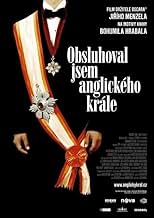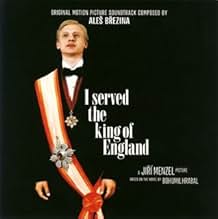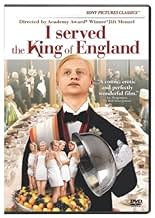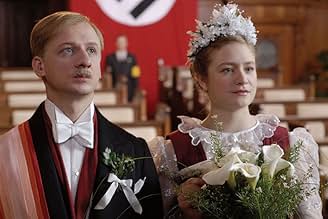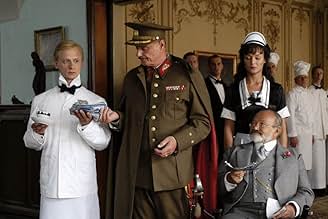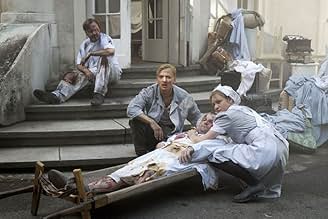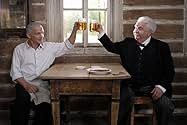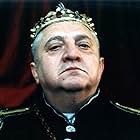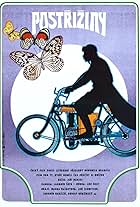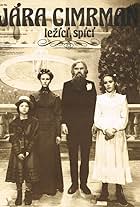IMDb RATING
7.3/10
8.4K
YOUR RATING
A look at the glamorous life at an old-world Prague hotel.A look at the glamorous life at an old-world Prague hotel.A look at the glamorous life at an old-world Prague hotel.
- Awards
- 12 wins & 13 nominations total
- Director
- Writers
- All cast & crew
- Production, box office & more at IMDbPro
Featured reviews
Menzel, faithful to Hrabal, shows the Fall of Czech Man - and Sudeten German Woman - and their expulsion from their respective Middle-European idylls: They tragically fall into each other's arms just as global issue is joined that soon disillusions our Romeo and destroys his (now unfortunately rampantly Nazi) Juliet.
Neither the quiet life of getting rich and enjoying all the pleasures money can bring, nor the stirring Wagnerian strains of Germanic supremacist idealism, can survive, but our opportunistic anti-hero, Ditie (a name which can translate as 'little man') is more adaptable, because his ideals are more pliant to the accidents of fate than his German wife's rigid Hitlerite fanaticism, and consequently he is eventually able to emerge from a sort of Communist Purgatory with a keen appreciation of life's real and much simpler necessities.
With profound irony, it is in a smashed and ethnically cleansed Sudeten German village that an older and a wiser Ditie's rehabilitation is completed. And it is from this sobering perspective that he can finally both regret the excesses and errors of his life, and yet also take nostalgic pleasure from what was, after all, the wonderful, glittering, profoundly human spectacle of folly and grandeur which his life has been! Far from tragic or depressing, therefore, this film of the 20th century debacle of a nation ruined remarkably concludes with a very Czech endorsement of the simple, inoffensive pleasure in life which will always console this patient people at the troubled heart of darkest Europe: Ditie allows himself to enjoy a tankard of Pilsener beer - and Menzel's camera seems to gild the moment with as much gloriously sensuous golden dreaminess and spiritual fulfillment as ever bloated millionaire or romantically excessive idealist knew.
At last, the little man has found his fulfillment where it always lay: in the little things. At last, old, disillusioned and unseduced any longer by the world's headier attractions, Ditie finds himself at home and happy.
Here, the film seems to be saying, is the real idyll to which the Czech person should retire for refreshment of the soul, and not those false - though fabulous - ones we have been forced to discard.
Just as Ditie observes that his own career of accidents always turned out well, so in this perspective the Czech experience seems, on the whole, to have turned out for the best. This optimistic fatalism seems typical of the Czech way of seeing things, and is as characteristic of this film of Menzel's old age as it was of his early masterpiece, 'Closely observed trains.' On this view, it would be churlish to condemn the film for self-indulgence, as many Western critics have done. Frankly, they haven't suffered so much, so what do they know of ethical conundrums and the moral paradoxes of survival? This meditation on the more inglorious struggles of the insignificant and friendless to survive deserves our respect, not an easy and priggish contempt. This must especially be true in the country which lies behind the heavily loaded title 'I served the King of England,' for this heavy hint must surely prick that particular national conscience with its role in one of history's most blatant acts of betrayal. The title practically dares any English commentator to judge Ditie in his historical predicament!
(There is also considerable satisfaction to be had by the viewer from the sheer technical finesse of the film's production, on every level. Jiri Menzel's craft is also hugely impressive in scene after scene, which are turned with complete mastery of tragi-comic effect. But this is a study for another occasion.)
Neither the quiet life of getting rich and enjoying all the pleasures money can bring, nor the stirring Wagnerian strains of Germanic supremacist idealism, can survive, but our opportunistic anti-hero, Ditie (a name which can translate as 'little man') is more adaptable, because his ideals are more pliant to the accidents of fate than his German wife's rigid Hitlerite fanaticism, and consequently he is eventually able to emerge from a sort of Communist Purgatory with a keen appreciation of life's real and much simpler necessities.
With profound irony, it is in a smashed and ethnically cleansed Sudeten German village that an older and a wiser Ditie's rehabilitation is completed. And it is from this sobering perspective that he can finally both regret the excesses and errors of his life, and yet also take nostalgic pleasure from what was, after all, the wonderful, glittering, profoundly human spectacle of folly and grandeur which his life has been! Far from tragic or depressing, therefore, this film of the 20th century debacle of a nation ruined remarkably concludes with a very Czech endorsement of the simple, inoffensive pleasure in life which will always console this patient people at the troubled heart of darkest Europe: Ditie allows himself to enjoy a tankard of Pilsener beer - and Menzel's camera seems to gild the moment with as much gloriously sensuous golden dreaminess and spiritual fulfillment as ever bloated millionaire or romantically excessive idealist knew.
At last, the little man has found his fulfillment where it always lay: in the little things. At last, old, disillusioned and unseduced any longer by the world's headier attractions, Ditie finds himself at home and happy.
Here, the film seems to be saying, is the real idyll to which the Czech person should retire for refreshment of the soul, and not those false - though fabulous - ones we have been forced to discard.
Just as Ditie observes that his own career of accidents always turned out well, so in this perspective the Czech experience seems, on the whole, to have turned out for the best. This optimistic fatalism seems typical of the Czech way of seeing things, and is as characteristic of this film of Menzel's old age as it was of his early masterpiece, 'Closely observed trains.' On this view, it would be churlish to condemn the film for self-indulgence, as many Western critics have done. Frankly, they haven't suffered so much, so what do they know of ethical conundrums and the moral paradoxes of survival? This meditation on the more inglorious struggles of the insignificant and friendless to survive deserves our respect, not an easy and priggish contempt. This must especially be true in the country which lies behind the heavily loaded title 'I served the King of England,' for this heavy hint must surely prick that particular national conscience with its role in one of history's most blatant acts of betrayal. The title practically dares any English commentator to judge Ditie in his historical predicament!
(There is also considerable satisfaction to be had by the viewer from the sheer technical finesse of the film's production, on every level. Jiri Menzel's craft is also hugely impressive in scene after scene, which are turned with complete mastery of tragi-comic effect. But this is a study for another occasion.)
I got a bit of a shock when I saw this film. It doesn't seem to follow the rules of contemporary film-making--in other words, women aren't shown as fully equal to men (although they can be very resourceful in dealing with petty tyranny) and the hero shows no sign of resentment for the way he is treated. I felt a lot closer to the great works of the heyday of classic film by Cukor, Ophuls and Lubitsch. The story unfolds calmly and logically, whether the events take place in the 30's, 40's or 50's of the last century. Ivan Barnev as the young Jan is superb: funny, roguish and balletic (just watch how gracefully he swoops around the restaurant with that heavy tray; wonder how much rehearsal time that needed.) Jiri Menzel made Closely Watched Trains, then saw his career go into eclipse after the Soviet invasion in 1968. The work he has done since hasn't come to my attention until now. This may be his swan-song, since he is 70 now, but I hope not.
Menzel's film is a modern masterpiece. It tells the story of one man's fate, as seen through the mythical pen of Bohumil Hrabal, one of the greatest Czech writers of the 20th century. The film is interspersed with documentary footage of the occupation of the remnants of the Czech republic in 1939. It tells how one man grows up in one system, survives another, and willingly submits himself to a third (Communist). The slogan "my happiness was always in the fact that some unhappiness overtook me" belongs to the East European theater of the absurd. For those of you who have seen the amazing performance of Julia Jentsch in "Sophie Scholl - The Last Days" it will come as a surprise, if not a shock, to see Ms. Jentsch play a character exactly opposite to the one which brought her such fame -- a true blue Nazi! But that's what great actors are made of -- anti-Nazi heroine this year, Nazi lover of the main protagonist the next. She learned some Czech for this role, but when she speaks in German, the screen shows Czech subtitles. Some scenes are really priceless, as when Dite is escorted out of his hotel (presumably in 1948), by two members of the Communist people's militia who at first are inclined to allow him to stay on as administrator of his now nationalized enterprise, but when he keeps insisting he is a millionaire and needs to be arrested, they willingly oblige. Irony stays with us through the film, starting with the opening scene when the elder Dite is released from a Communist jail in Prague and he explains: "I was sentenced to 15 years (for being a millionaire), but because of the amnesty, I only had to sit for 14 and 3/4."
While filming a novel is always difficult.. I think this film captures the spirit of the novel.. one man' life as he succeeds and fails and survives and never seems to be really touched by the world events happening around him (the story starts in 1920's and ends mid-1960's) The actors are perfectly cast, especially the two actors playing Jan Dite. The cinematography is wonderful, as is the music. I have read the novel and I live in the Czech Republic, so I have familiarity with both the story and the culture, but I think the story is universal enough for all audiences to enjoy this film.
This is one of the biggest budget Czech films ever and you can see ALL of the money on the screen, costumes, sets and locations (including the beautiful Hotel Parziz in Prague, which is unchanged from when it was built!)
highly recommend this film to anyone who loves melancholy, sweet stories with a bit of political commentary thrown in for good measure....
This is one of the biggest budget Czech films ever and you can see ALL of the money on the screen, costumes, sets and locations (including the beautiful Hotel Parziz in Prague, which is unchanged from when it was built!)
highly recommend this film to anyone who loves melancholy, sweet stories with a bit of political commentary thrown in for good measure....
The works of Czech director Jiri Menzel constitute a tasty cocktail of humanism and laughter. In this film, the cocktail is personified in the words spoken by the narrator and lead character early in the film: "It was always my luck to run into bad luck." Menzel's innocent male country bumpkins have simplistic goals in life-get rich and charm the beautiful woman in their horizon. His films remind you of the social satire embedded in the works of Charles Chaplin and the visual gags in the cinema of Buster Keaton. Only Menzel's body of work has a dose of moral ambiguity.
While Menzel's cinema is often mistaken as being solely his own genius, he actually rides on the shoulders of three major literary giants of the former CzechoslovakiaBohumil Hrabal, Vladislaw Vancura, and Zedenek Sverak. Menzel's cinema provides a convenient "easy read." of the fine literary tradition to which Milan Kundera belongs by bringing alive on screen slivers of statements and observations recorded by these novelists. Menzel's true gift is making the written word look attractive on screen with the use of imaginative visual gags. The spoken words (the writer's contribution) and carefully chosen actors serve as the pivot to enjoy the visual feast in Menzel's cinema. His mastery of visual comedy has made a major difference to Czech cinema being associated with comedy rather than drama, quite unlike other East European cinema where tragedies and serious drama overshadowed the comedy genre.
This film happens to be the sixth work of Hrabal that Menzel has adapted on screen-the first being "Closely watched trains."
Politicians find satire uncomfortable. It is not surprising that Hrabal's novel "I served the King of England" was banned for years. When ultimately Menzel made it into a movie in 2006 using Hrabal's script, it won the FIPRESCI prize at Berlin. Menzel's cinema (and Hrabal's novels) has considerable political and social criticism. The film opens with clemency/pardon given to a prisoner who has almost completed his jail term. Communist political bigwigs wish to ape the capitalists, without a clue of what is required to gain social respect. Hrabal's script is clearly critical of the communist regime: "People who said social work was ennobling were the same men who drank all night and ate with lovely young women seated on their knees.' Butlers act superior to their new masters who do not know social etiquette. The new Czech communist politicos bend over backwards to please any one with the remotest Russian credentials. It is no small wonder that Hrabal got into trouble with the authorities until the political regime changed in recent years.
Apart from political criticism, social criticism of Czechs get liberally dished out in the film. When the physically short-statured waiter Jan Dite (literally translated as Johnny Child) throws coins on the floor for fun, rich and poor Czechs crawl without social distinction on the floor to pick up the money, allowing the short-statured waiter to look down at those he was serving and emerge physically and socially "tall" for a brief period. There is another line that Hrabal/Menzel uses to describe Czechs and their actions over the decades "Czechs do not fight warstherefore we were not invaded, we were annexed." These are lines that will make many laugh, but these lines could make the author/ the director unpopular with a few who cannot take self criticism.
The quest for money and riches underpin this film in particular and much of Menzel's cinema. The film has the lead character selling sausages at a railway station. So engrossed is he in counting the change he has to return to a customer who has given him a big bank note, that the train pulls out with the angry customer fuming that he has been cheated. But Hrabal and Menzel had together done a similar scene in "Closely watched trains" where a train pulls out as the young hero is about to kiss his love with eyes closed, taking away his beloved girl whose eyes are open and is agitated that the kiss was missed.
Money is a recurring theme in "I served the King of England." The hero dreams of being a millionaire. One colorful character keeps himself amused spreading out cash on the floor like a carpet. Money is what waiter's get if he is good and smart, enough to buy up the hotel. He gets a medal from an Ethiopian Head of State, modeled on the physical attributes of Haile Selassie; merely because he can bend down to receive it. He gets a fat tip because he is physically near to a rich guest doling out his largesse.
After one has laughed sufficiently, one could reflect on the less obvious but darker side of Hrabal/Menzel's contribution to cinema. The women are lovely to look at. They bear a striking common factorthey are to be won. They are to be used, often as useful commodities. One Nazi girl even makes love, thinking of Hitler during the act. You do not see Hrabal and Menzel developing the women characters as they do their male ones. In this film, the anti-hero is dismissed from his job because he is not a good Czech.
"I served the King of England" are the spoken credentials of a respected waiter in the film as he trains the lead character of the film. Yet, the film is about a successful Czech who became a millionaire as he had dreamt, who married a Nazi and had enjoyed life when other Czechs were being led to the gas chambers, and was imprisoned when the Communists came to power. Hrabal and Menzel may have given us great comedy over six films. Evaluate the content closely and there is more to their work than pure comedy.
While Menzel's cinema is often mistaken as being solely his own genius, he actually rides on the shoulders of three major literary giants of the former CzechoslovakiaBohumil Hrabal, Vladislaw Vancura, and Zedenek Sverak. Menzel's cinema provides a convenient "easy read." of the fine literary tradition to which Milan Kundera belongs by bringing alive on screen slivers of statements and observations recorded by these novelists. Menzel's true gift is making the written word look attractive on screen with the use of imaginative visual gags. The spoken words (the writer's contribution) and carefully chosen actors serve as the pivot to enjoy the visual feast in Menzel's cinema. His mastery of visual comedy has made a major difference to Czech cinema being associated with comedy rather than drama, quite unlike other East European cinema where tragedies and serious drama overshadowed the comedy genre.
This film happens to be the sixth work of Hrabal that Menzel has adapted on screen-the first being "Closely watched trains."
Politicians find satire uncomfortable. It is not surprising that Hrabal's novel "I served the King of England" was banned for years. When ultimately Menzel made it into a movie in 2006 using Hrabal's script, it won the FIPRESCI prize at Berlin. Menzel's cinema (and Hrabal's novels) has considerable political and social criticism. The film opens with clemency/pardon given to a prisoner who has almost completed his jail term. Communist political bigwigs wish to ape the capitalists, without a clue of what is required to gain social respect. Hrabal's script is clearly critical of the communist regime: "People who said social work was ennobling were the same men who drank all night and ate with lovely young women seated on their knees.' Butlers act superior to their new masters who do not know social etiquette. The new Czech communist politicos bend over backwards to please any one with the remotest Russian credentials. It is no small wonder that Hrabal got into trouble with the authorities until the political regime changed in recent years.
Apart from political criticism, social criticism of Czechs get liberally dished out in the film. When the physically short-statured waiter Jan Dite (literally translated as Johnny Child) throws coins on the floor for fun, rich and poor Czechs crawl without social distinction on the floor to pick up the money, allowing the short-statured waiter to look down at those he was serving and emerge physically and socially "tall" for a brief period. There is another line that Hrabal/Menzel uses to describe Czechs and their actions over the decades "Czechs do not fight warstherefore we were not invaded, we were annexed." These are lines that will make many laugh, but these lines could make the author/ the director unpopular with a few who cannot take self criticism.
The quest for money and riches underpin this film in particular and much of Menzel's cinema. The film has the lead character selling sausages at a railway station. So engrossed is he in counting the change he has to return to a customer who has given him a big bank note, that the train pulls out with the angry customer fuming that he has been cheated. But Hrabal and Menzel had together done a similar scene in "Closely watched trains" where a train pulls out as the young hero is about to kiss his love with eyes closed, taking away his beloved girl whose eyes are open and is agitated that the kiss was missed.
Money is a recurring theme in "I served the King of England." The hero dreams of being a millionaire. One colorful character keeps himself amused spreading out cash on the floor like a carpet. Money is what waiter's get if he is good and smart, enough to buy up the hotel. He gets a medal from an Ethiopian Head of State, modeled on the physical attributes of Haile Selassie; merely because he can bend down to receive it. He gets a fat tip because he is physically near to a rich guest doling out his largesse.
After one has laughed sufficiently, one could reflect on the less obvious but darker side of Hrabal/Menzel's contribution to cinema. The women are lovely to look at. They bear a striking common factorthey are to be won. They are to be used, often as useful commodities. One Nazi girl even makes love, thinking of Hitler during the act. You do not see Hrabal and Menzel developing the women characters as they do their male ones. In this film, the anti-hero is dismissed from his job because he is not a good Czech.
"I served the King of England" are the spoken credentials of a respected waiter in the film as he trains the lead character of the film. Yet, the film is about a successful Czech who became a millionaire as he had dreamt, who married a Nazi and had enjoyed life when other Czechs were being led to the gas chambers, and was imprisoned when the Communists came to power. Hrabal and Menzel may have given us great comedy over six films. Evaluate the content closely and there is more to their work than pure comedy.
Did you know
- TriviaThe scenes for the Hotel Pariz restaurant were filmed in the main restaurant in Prague's Obecni Dum (Civic House), just around the corner from the actual Hotel Pariz. Both restaurants were designed in the Art Nouveau style by artist Alphons Mucha, but the Obecni Dum restaurant is larger.
- GoofsJan sees a train full of people being deported to a concentration camp. A closeup of one of the cars shows men within wearing gray and white striped uniforms. However, deportees were sent to the camps wearing their civilian clothes and weren't issued uniforms until after they arrived.
- Quotes
Jan Díte, older: A person becomes most human, often against his own will, when he begins to founder, when he is derailed and deprived of order.
- ConnectionsEdited into CzechMate: In Search of Jirí Menzel (2018)
- How long is I Served the King of England?Powered by Alexa
Details
- Release date
- Countries of origin
- Official sites
- Languages
- Also known as
- 我曾侍候過英國國王
- Filming locations
- Production companies
- See more company credits at IMDbPro
Box office
- Budget
- CZK 84,450,000 (estimated)
- Gross US & Canada
- $617,403
- Opening weekend US & Canada
- $53,218
- Aug 31, 2008
- Gross worldwide
- $7,354,478
- Runtime1 hour 53 minutes
- Color
- Sound mix
- Aspect ratio
- 1.85 : 1
Contribute to this page
Suggest an edit or add missing content

Top Gap
By what name was I Served the King of England (2006) officially released in Canada in English?
Answer

